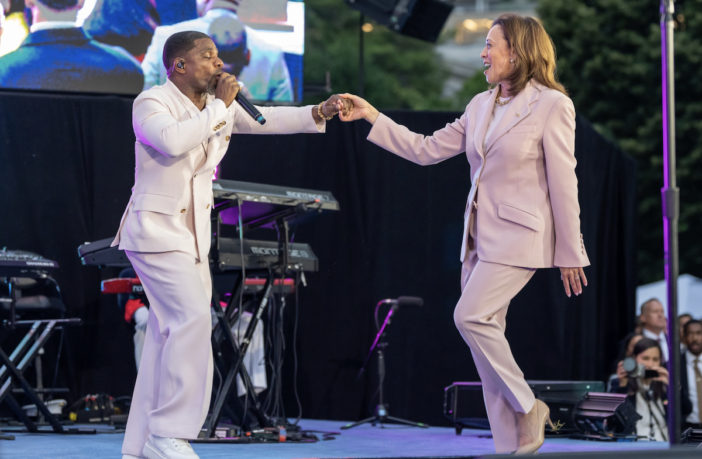The White House marked Juneteenth with a vibrant celebration on the South Lawn on Monday. Legendary artists such as Patti LaBelle, Gladys Knight, Charlie Wilson, Kirk Franklin and Anthony Hamilton ignited an audience at the White House for their second annual Juneteenth a week before the holiday.
The event featured a star-studded crowd with stars such as Billy Porter, Symone Sanders, Don Lemon and Claudia Jordan in attendance.
“Our ancestors are smiling down on us celebrating something that would have seemed unfathomable,” Wilson said during his performance concluding the concert.
The reflection was an accurate depiction of the evening which featured numerous unexpected moments. LaBelle kicked off her shoes while singing “Oh People,” Doug E. Fresh danced with Maxine Waters and Vice President Kamala Harris swayed on stage with Franklin.
“Juneteenth definitely is one of those eras in history that I love to see that we are reimagining and rewriting so the next generation can understand the value and importance of trying to get it right,” Franklin said in an interview with Billboard.
The concert not only boasted a musical journey through history but also included a slide show presentation narrated by famed comedian Roy Wood Jr. who chronicled the past 156 years of Black history.
“It’s important to know how we got all the way from enslavement to the first Black woman vice president and the first Black woman on the Supreme Court,” Wood proclaimed.
Much of the forward trajectory had to do with advocates like 97-year-old Texas native Opal Lee, who received the Presidential Medal of Freedom last month. Lee collaborated with President Joe Biden to create formal legislation surrounding the events that occurred on June 19, 1866, marking the disbandment of slavery in the United States.
Although the Juneteenth holiday has been celebrated by Black families for the past century, it was not federally recognized until 2021.
Biden said Juneteenth is, “A day of profound weight and power. A day to remember the original sin of slavery and the extraordinary capacity to emerge from the most powerful moments and the painful moments with a better vision for ourselves. A day that reminds us we have a hell of a lot more work to do.”
He reaffirmed his executive decision to instate the holiday before a crowd on the South Lawn including lawmakers Jim Clyburn, Maxine Waters and Steven Horsford. A group that will now work alongside his administration to facilitate a National Day of Voting on the holiday next week. Vice President Harris has declared Juneteenth, June 19, 2024, as one of three National Days of Action on Voting to focus on voter engagement ensuring all Americans have the information they need to vote.
During her remarks at the concert, Harris said, “While Juneteenth is a day for celebration, it is also a day for dedication; a day to rededicate ourselves to the ongoing and unfinished work of our American experiment; a day to renew our commitment to defend our freedoms, to honor our history, and to continue to fight for the promise of America.”
In conjunction with the celebration, the President’s Committee on the Arts and the Humanities organized the second annual Juneteenth National Independence Day event in partnership with the White House. The large-scale concert also honored Black Music Month, showcasing African American musical legends and underscoring the cultural importance of this federal holiday.
Aligned with Biden’s executive order on Promoting the Arts, the Humanities, and Museum and Library Services, several federal agencies announced new initiatives to protect African American history and culture. The National Archives Museum will display the original Emancipation Proclamation and General Order No. 3 from June 18 to June 20, while the National Park Service will offer free entrance to park sites on Juneteenth.
The National Endowment for the Humanities (NEH) has launched a digital repository to deepen public understanding of African American history. Additionally, NEH will establish a nationwide program celebrating Juneteenth, leading to a grand 160th-anniversary celebration in 2025.
In response to the rising incidence of book bans targeting historically marginalized groups, the U.S. Department of Education announced it had appointed a coordinator to address the impact of such restrictions on civil rights. The White House Initiative on Advancing Educational Equity will host events emphasizing the importance of culturally relevant education.
The National Endowment for the Arts (NEA) plans to announce new recipients of the NEA Jazz Masters Fellowship, celebrating the contributions of African American musicians to jazz. The Institute of Museum and Library Services (IMLS) will highlight projects that preserve African American history as part of its “250: All Stories. All People. All Places initiative.”
The administration said it has significantly invested in preserving African American history through infrastructure and preservation projects. The Department of Interior’s National Park Service (NPS) and the Historic Preservation Fund have allocated substantial funds for these efforts, including grants to support underrepresented communities and historic site nominations.
Federal agencies, including the Department of Transportation, are working to document and uplift the stories of communities affected by past federal policies. The NEH prioritizes projects that preserve historical collections on slavery and its legacies. At the same time, the President’s Committee on Arts and the Humanities will launch initiatives to support underserved creative and cultural communities.
“Through these actions and policies, the Biden-Harris administration reaffirms its commitment to advancing racial equity and ensuring that America’s promise is realized for all citizens,” the White House said in a Fact Sheet.



